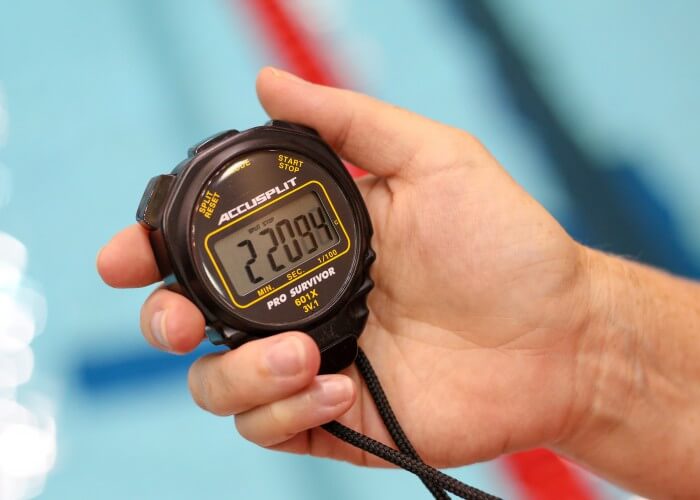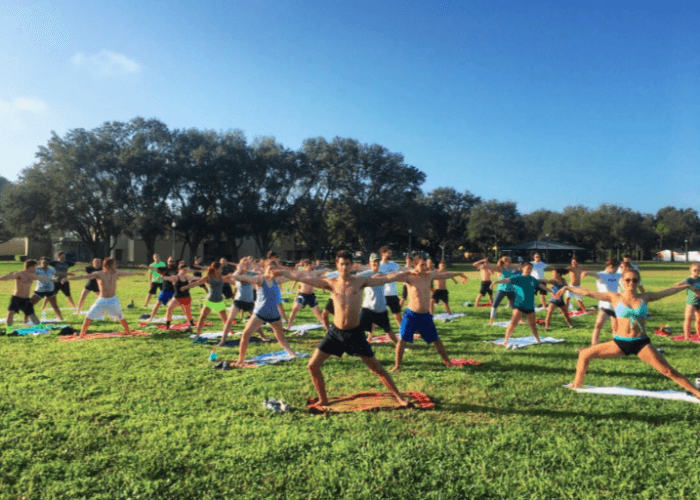A Swimmer’s Guide to Running: From Water to Land

A Swimmer’s Guide to Running: From Water to Land
Running is often considered a swimmer’s worst nightmare. Swimmers dread it. After all, we’re meant for water, not land. But running doesn’t have to be the enemy. Especially in situations in which COVID-19 has caused havoc with training schedules, running has become an accessible option.
If you do get the itch to lace up your sneakers and venture out to try a land sport, follow these 10 tips in the running survival guide for swimmers.
Tip #1: Appropriate attire.

Photo Courtesy: Pexels
It will be weird to exercise with something on your feet, but proper running shoes are crucial. Invest in a good pair that provides support to avoid injury. Your new hobby of running is also an excellent excuse to get new workout clothes that aren’t a swim suit. Whatever you do, leave your fins at home—they’re extremely difficult to run in.
Tip #2: Breathe.

Photo Courtesy: Greg Alrich
We’re used to not breathing as swimmers, but remember: running is not a breath control set. Swimming has drastically increased our lung capacity which carries over into running. When running, you should generally breathe in and out through your mouth. Make sure your breath extends all the way to your stomach, not shallow breaths from your chest. Focusing on rhythmic breathing will help your overall running efficiency.
Tip #3: Proper nutrition.

Photo Courtesy: Maxpixel
Nutrition plays a big role in both swimming and running. Eating healthy and getting proper nutrients won’t automatically make you a faster swimmer or runner, but it will give you the fuel your body needs to stay healthy and perform its best. It’s imperative to hydrate before, during and after your run; you will be more susceptible to cramps if you’re dehydrated. Sports drinks after your workout can help replace electrolytes lost through sweat as well.
Tip #4: Find a route.

Photo Courtesy: Max Pixel
Even though we may want to be close to our home turf, running on the pool deck is a disaster waiting to happen. The beauty of running is that you get to look at something other than a black line or your teammates’ feet. Map out different routes around your neighborhood or campus that are safe to run that offer a change of scenery. If you have to run on a treadmill, make sure you have a good playlist or a TV show to watch.
Tip #5: Focus on form.

Photo Courtesy: Huffington Post
Proper form and good technique prevents injury in swimming, and running is no different. When it comes to land activities, swimmers often have two left feet. The last thing anybody wants is for an injury to occur from running, so follow these basic tips for good running form:
- Relax your shoulders.
- Engage your core.
- Keep your knees in line.
- Focus on quick and short strides.
- Push up and off the ground.
Tip #6: Start small.

Photo Courtesy: Kevin Liles-USA TODAY Sports
During your first practice back after some time away from the pool, you don’t expect yourself to be able to hold intervals you can when you’re in peak training. Same thing with running—don’t expect to be able to run a marathon your first time out. Start by alternating a run/walk combo, then work your way up to a couple of miles, then gradually add a few more in each time.
Tip #7: Set goals.

Photo Courtesy: Emily Cameron
Goal setting is engraved in our brains as swimmers. Just like we do at the start of each swim season, set goals for what you want to get out of running. Maybe you just want a new activity to increase your overall fitness or a new hobby if your swim career has ended. Maybe you want to be able to run a 5k by the end of the summer or are training for a half marathon in the fall. Whatever your goal for running may be, make sure it motivates and excites you.
Tip #8: Warm up.

Photo Courtesy: Pexels
Imagine rolling out of bed and having to race a 400 IM or sprinting a 50 free with absolutely no warmup. You probably wouldn’t swim very fast, and you’d definitely feel it the next day. You don’t want to cold-turkey a run either. Start off by walking or slow jogging to loosen your legs up before gradually increasing speed. Dynamic exercises to get your heart rate up are also a good warmup before a run.
Tip #9: Cool down.

Photo Courtesy: Pexels
During an already hectic schedule, cool down is sometimes the last thing you want to do but it’s extremely important and shouldn’t be overlooked. Just like after swim practice or a race, try to cool down for at least a little bit after each run. Near the end, start to jog a little slower or walk for a few minutes to relax your legs. Static stretching is best when done right after a workout when the muscles are already warm.
Tip #10: Try other forms of exercise.

Photo Courtesy: Meaghan Abelein
Whether you’re newly retired, taking a short break from swimming or just trying to find new ways to stay active, there are countless ways to stay in shape in addition to running that will still give you a break from the water. Mix in yoga, cycling, hiking, circuit training, or Zumba to give your running legs a break. Find something that you’re excited about so your workout doesn’t seem like work.
Wherever your feet lead you, just don’t run on the pool deck.
All commentaries are the opinion of the author and do not necessarily reflect the views of Swimming World Magazine nor its staff.




Aimee Robertson…..xx